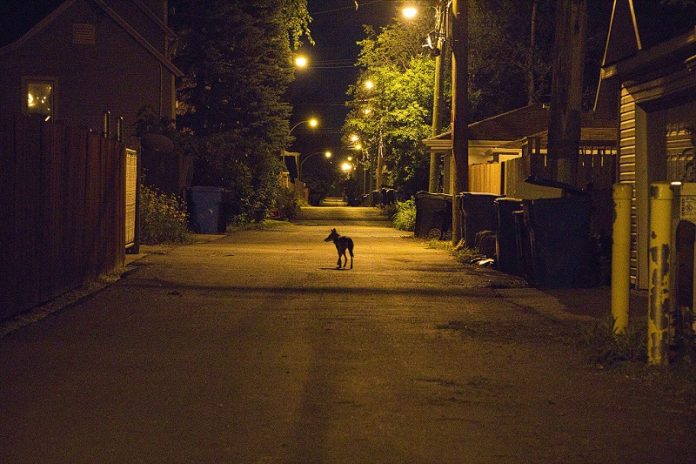
Atlanta, home to over 6 million people, a vibrant film and music scene, and now, a growing population of coyotes.
Thanks to new video footage from the University of Georgia (UGA), we are learning more about how coyotes live and move around the city.
UGA’s Warnell School of Forestry and Natural Resources, in partnership with Wildlife Atlanta and the Georgia Department of Natural Resources, is studying coyotes in Atlanta.
They are using GPS collars with cameras to track the daily activities of these adaptable animals. The goal is to understand their behavior and reduce negative interactions with humans.
The videos reveal that coyotes mostly avoid people and busy areas during the day. Some clips show coyotes resting in wooded areas, grooming their pups, and drinking from creeks. However, once night falls, coyotes become more adventurous.
Footage shows them scavenging in parking lots and exploring near a radio station.
Michel Kohl, the lead researcher and an associate professor at UGA, notes that coyotes have spread across the U.S., even to dense urban centers like Atlanta.
This study helps us understand their behavior in cities, which can be applied to other large metropolitan areas.
Kohl hopes these videos will answer common questions about coyotes and reassure people that these animals pose little risk to humans.
Are there coyotes in Atlanta?
Yes, coyotes are found in every state, including urban areas like Atlanta. They first arrived in Georgia in the 1970s and eventually made their way into the metro area. Coyotes are most active at dawn and dusk, but in cities, they have become more nocturnal to avoid humans.
If you see a coyote during the day, there is no need to panic. It may have been scared out of its hiding spot by people. While coyotes can carry rabies, it is uncommon.
Are coyotes dangerous to children?
Coyotes generally avoid humans. Attacks on people are very rare and usually happen when people feed coyotes. If a coyote gets too close, make loud noises or spray it with a hose to scare it away.
Will coyotes hurt my pets?
Probably not, but there are precautions you can take. Do not feed coyotes and secure your garbage, pet food, and birdseed. Keep small pets indoors or on a leash, and close off crawl spaces under your house to prevent coyotes from making a den.
Coyotes mainly eat small mammals and fruit but will also scavenge discarded food. The videos showed coyotes feeding on feral cats, though it was unclear if the cats were roadkill or hunted by coyotes. There were no videos of coyotes interacting with dogs. Keeping cats indoors is the best way to protect them.
What diseases can coyotes carry?
Coyotes can contract diseases similar to those in dogs, such as rabies, distemper, parvo, and heartworms. Vaccinating your pets and keeping their preventive medications up to date will minimize their risk.
Rabies is the most concerning disease for humans, but it is typically transmitted through bites. By minimizing interactions with coyotes, the risk of being bitten is extremely low.
Understanding coyote behavior and taking simple precautions can help coexist with these adaptable animals in urban environments.



